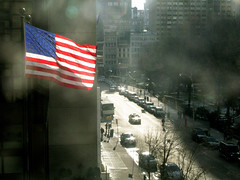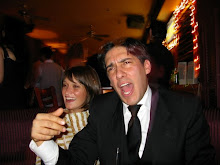 What Do Women Want? Understanding The Fluidity of Female Desire
What Do Women Want? Understanding The Fluidity of Female Desire
Originally uploaded by lorenzodom*Photo originally posted June 16, 2007, Un Deux Trois
What Do Women Want?
Understanding The Fluidity of Female Desire
New York City, January 28, 2009:
A recently published article in the New York Times (What Do Women Want?, Daniel Bergner, January 25, 2009) presents a thorough summary of many different recent clinical and behavioral psycho-sexual studies and confirms what many of us all already know—men and women desire differently.
As both rigid scientific studies and informal observations have shown over the years, men tend to draw a narrow-minded physiological path toward arousal, whereas women are open to being stimulated by almost anything, especially if it involves piquing their emotions and psyche.
More surprisingly though, the article seems to conclude that women not only desire differently, but who they desire is significantly different too. For recent studies show women who proclaim to tender only heterosexual inclinations (i.e. desire toward men only), may actually be in denial, as the results of measured vaginal transudation counters what the test subjects otherwise report verbally.
Research also found that men with high sex drives report a greater polarized pattern of attraction than most males (that is, heterosexual men are much more attracted to women than any inclination toward men, and likewise, homosexual men, are much more attracted to men than any inclination toward woman ).
However, this is NOT the case for women. Because in women the opposite is generally true: the higher the sex drive, the greater the attraction to both sexes.
That said, I also recently read a piece in Psychology Today (Finding the Switch: Homosexuality may persist because the associated genes convey surprising advantages on homosexuals' family members, May/June 2008) that argues that homosexuality may be a result of evolution.
As a result, it is argued that women have gay sons because it is to their advantage, because they will "protect" them, so to speak (i.e. they will never leave their mothers and will always love them...). The article also notes that women with a greater sex drive, often had a higher dose of testosterone (thus, more likely to have the same inclinations as a man so to speak) and thus were more likely to have gay sons.
Last week’s New York Times article also reports that there is a female equivalent of Viagra on the way called Flibanserin. “The medication was originally meant to treat depression — it singles out the brain’s receptors for the neurotransmitter Serotonin. As with other such drugs, one worry was that it would dull the libido. Yet in early trials, while it showed little promise for relieving depression, it left female — but not male — subjects feeling increased lust.”
That said, my personal experience has been, that within a certain demographic of women, aged roughly between 24-42, (see A Little Love and Affection (Is All We Need) for more on this controversial theory), lust is occasionally, if not often, driven by the desire to procreate…
In other words, I M U S T H A V E B A B Y!
As much as men (mostly) make fun of this nagging desire, in a few frank conversations I’ve had with women of this particular sector, it appears that this desire is actually quite real and physiologically (esp. hormonally) driven.
Thus, albeit the makers of Flibanserin are not being forthcoming as to what neurological receptors they are tapping or blocking, I would infer that it could very well be whatever ever causes baby fever.
*
Getting back to the basis of basic desire, the article also cites studies that conclude “men may rely more on such physiological signals to define their emotional states, while women depend more on situational cues.”
In other words, women are more sensitive to the people and world around them, they don’t have to be hit in the head to get a clue. Phrased differently, later on in the article the author concludes “Female desire may be dictated — even more than popular perception would have it — by intimacy, by emotional connection.”
However, that said, this is only another reason as to why women might naturally be inclined to have an attraction to other women—because women understand what makes women tick—feel good, feel bad, better, whatever. Women know how to make other women feel good much better than men generally do (“Uh, what? I’m like touching her, ain’t that enough?”).
As a related aside, this article discusses the idea that female lubrication is also evolutionary. Citing studies on rape, Bergner writes, “Evolution’s legacy, according to this theory, is that women are prone to lubricate, if only protectively, to hints of sex in their surroundings.” In other words, men should note that just because a woman is wet, does not mean she is whet—for apparently orgasms are not the only signs of arousal that can be faked too.
*
All that said, in addition to the empathy factor, I’ve long heard both men and women declare that women are simply more naturally beautiful to begin with. Hence, the millennia of art and odes and images that have focused on feminine beauty, as opposed to that of the harder, courser, often more rugged, male physique.
Moreover, as this New York Times piece proposes toward the end—there is something to be said about “being desired” too that makes women desirable to both men and women.
For women have long been perceived as, and made an effort to, make themselves desirable. Men, for the most part, at least straight men for the most part, are not as naturally inclined to be as preoccupied by their looks and their quotient of fatal attraction. Gay men on the other hand, seemingly readily understand and empathize women better and thus their impulse to make themselves desirable.
To support this insight, in a study of visual attention in heterosexual men and women where subjects looked at pictures of heterosexual foreplay, it was found that the men stared significantly more at the females than at the males. However, “the women gazed equally at the two genders, their eyes drawn to the faces of the men and to the bodies of the women — to the facial expressions, perhaps, of men in states of wanting, and to the sexual allure embodied in the female figures.”
To simplify and bring it back home, women simply want to be desired (but then again, who doesn't?)
Thus, as much as many women have, during a certain period in their life, had the impulse to find a good man she can trust, one who will provide a good home and protect her and her children—underlying this need is also the desire to be ravaged against a wall in some dark alley by some tall, dark and handsome stranger.
*
For the last decade or so, the AIDS epidemic has tainted sex. Subsequently, prevention, in the form or instilling fear and encouraging abstinence, made the natural feeling of desire a monster. Prudence concluded that the Summer of Love of 1969 and the following decade of indulgence, led us to where we are now. Thus, for the last decade or so, desire was denied entrance into the realm of life because it became the probable cause of looming epidemiological disaster.
However, as more and more studies on the alarming surge of STDs are confirming, because people are tired of denying their internal impulses, they are perilously traversing the divide between reason and desire, and have begun behaving in ways that may be worse than when this whole crisis began.
At the same time, people are looking toward alternative means of satisfying their sexual impulses safely.
Thus, I’ve found that some brave women are just starting to explore and accept their natural inclinations toward other women. Since it is perceived to be relatively safer than having sex with men and both sexes usually agree that women are on the whole more beautiful than men, it seems that more women, both young and old, are exploring their so-called Sapphic inclinations and allowing themselves to venture, to go where many women have not gone before, and dip their toes in the forbidden waters of Lesbos.
*
Twenty years ago, a Greek friend of mine, Phyllis, told me “I think we are all born with a natural desire and love for both sexes. It is only life that determines whether we lean toward one way or another.”
Even since that certain epiphany, I’ve pondered and wondered and inquired about the intrinsic nature and motivations of desire and love in us all.
Having long made an effort to be aware of my own deep-seeded sexual and amorous penchants and desires (i.e. I Love All Women), I have long been interested in understanding those whom I love.
Sexologist Lisa Diamond argues that “quite possibly for women on the whole, desire is malleable, that it cannot be captured by asking women to categorize their attractions at any single point, that to do so is to apply a male paradigm of more fixed sexual orientation…For women on average, she stresses that desire often emerges so compellingly from emotional closeness that innate orientations can be overridden. This may not always affect women’s behavior — the overriding may not frequently impel heterosexual women into lesbian relationships — but it can redirect erotic attraction.”
Thus, I’d be interested to hear from you and what you discern to be the truth underlying desire.
What do you think?
Do women want more women?
Do women desire differently than men? If so, how?
My enquiring mind wants to know…
“The Baroness has joked that she has helped my sex life. It’s possible, not because I’m binding or getting bound, but because that world can teach you a lot about being open about desire.”
Daniel Bergner (from Surveying the Outer Reaches of Lust: An interview with Daniel Bergner, author of The Other Side of Desire: Four Journeys Into the Far Realms of Lust and Longing, by Charles McGrath, New York Times Magazine, January 23, 2009)
*
Check Out My Bookstore:
www.blurb.com/user/store/lorenzodom






